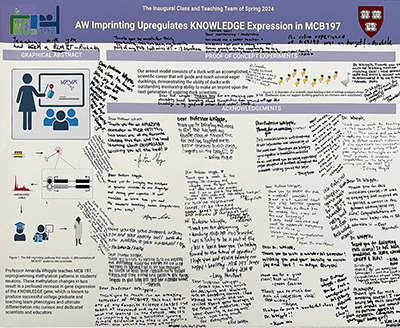MCB Assistant Professor Amanda Whipple introduced a unique course this spring: MCB 197, Gene Regulation: A Bench-to-Bedside Journey. This course, unlike any other, delves into the intricate process of gene regulation and its application in real-world therapeutic development. The students’ reviews have been nothing short of magnificent!
Meet the first MCB 197 class
As Whipple described last fall, “The motivation for developing this new course stems from wanting to share my scientific expertise and personal experience with students. Over multiple stages of my career in science, I’ve studied how the cell decides if a particular gene should be expressed, how mutations in the genome alter different aspects of gene expression regulation, and approaches that can be used to correct gene expression in disease.”
Forty students eagerly enrolled in the inaugural class of MCB 197. Their active participation and enthusiasm were so remarkable that they created a personalized poster of thanks, signed by each student, which was delivered to Whipple on Tuesday during the final class of the course.
Just a few examples of the students’ praise:
• The course was impeccably organized
• All teaching staff were available for one one-on-one discussion and assistance
• Assignments prioritized hands-on experience with therapeutic design tools
• In-class activities were enjoyable and effective learning opportunities
The poster designed by Serafina Nieves with the students’ feedback
Graduate student Serafina Nieves, was one of three TAs assisting Professor Whipple in the MCB 197 course, along with graduate student Rishabh Kapoor and Aditi Limaye, MD, PhD candidate at Harvard Medical School. “There’s no doubt in my mind that much of the success of this course is due to Professor Whipple’s impeccable organization skills,” Nieves says. “From the course materials to the schedule, everything was laid out well in advance, and every member of the teaching team knew exactly what they were responsible for and who to ask for help when needed. I think that was critical for this course to run smoothly, especially as a first-time offering. Professor Whipple also has a great feel for lecture design. You could tell every slide was designed with intention, many with custom graphics that she put together herself.”
The course enrolled students from a wide variety of disciplines, including statistics, economics, and biology concentrations. “We tried to make the course approachable to students who might be learning about gene regulation for the first time while challenging them to do as an academic researcher does: read primary research articles, use genome browsers, design guide RNAs, and engage with experts in the field,” adds Nieves. “We have been blown away by the growth students have shown throughout the semester, especially by their capstone projects, which are conference-style posters that detail the students’ own design for an ASO or CRISPR-based therapeutic.” The capstone project fostered mastery of core course concepts but also allowed students to exercise their scientific creativity.
Nieves recalls that multiple students met with Professor Whipple to discuss academic and industry research one-on-one. “I think the students found those meetings really helpful, especially given Professor Whipple’s unique perspective having done an industry postdoc and then returning to academia,” she says. In mid-semester evaluations, the team received encouraging positive feedback about breakout sessions that were designed to give students experience with tools in the field, and prepare them for their capstone project where they would have to use those tools to analyze and interpret real data. “We were happy to see that students felt more confident in their skills and more prepared for other course assignments after engaging with these sessions.”
Rishabh Kapoor observed that the students were highly motivated by the bench-to-bedside philosophy, which integrated foundational mechanistic knowledge in molecular biology with cutting-edge therapeutic applications. He believes that this unique approach allowed students to immediately appreciate the real-world application of the concepts they were learning.
“Professor Whipple’s lectures were clear and concise and always paired with interactive learning opportunities, and the students really appreciated the opportunity to practice concepts in multiple settings,” Kapoor says. “She put a lot of thought into the design of lectures, problem sets, and hands-on, in-class activities. Each of these was drafted months in advance with input from the entire teaching team and underwent multiple rounds of revision. In addition, Amanda and the teaching team strove to create an inclusive learning environment in which students were encouraged to approach the subject with both curiosity and empathy for the patients who will be directly affected by these therapies.”
Kapoor believes one of the reasons the course was so highly enrolled is that “it’s an exciting time to be studying molecular biology and gene therapeutics! Within the past few years, we’ve seen the successful clinical deployment of the first generation of CRISPR and antisense oligonucleotide therapeutics to previously untreatable conditions. There’s a real sense that we’re on the cusp of a revolution in molecular medicine, and students felt privileged to learn about these cutting-edge therapeutics from an expert in the field.”




